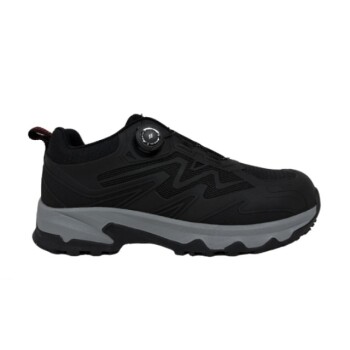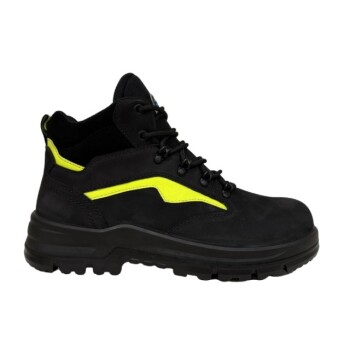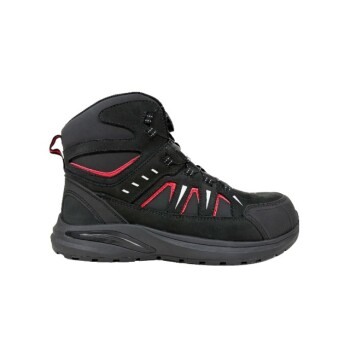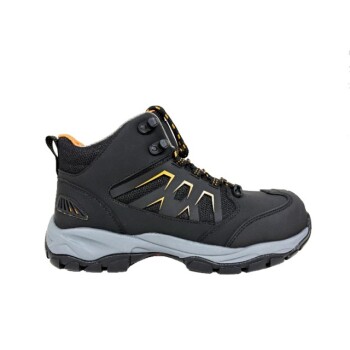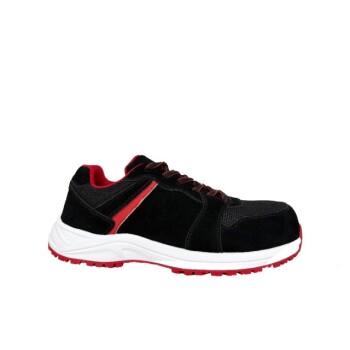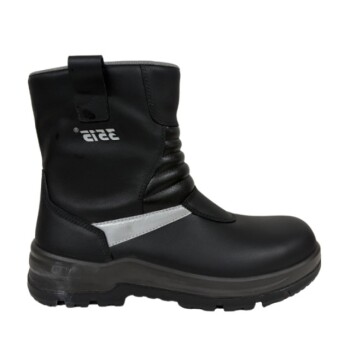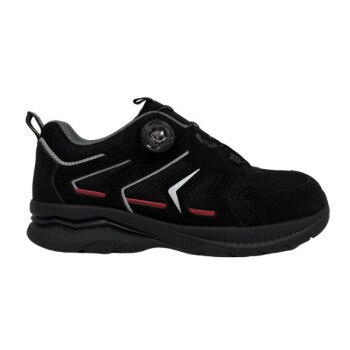At its core, the choice between steel and composite toe work shoes is a trade-off between maximum protection and specialized functionality. Steel toes offer the highest level of defense against impact and compression, making them the traditional standard for heavy-duty work. Composite toes, built from non-metallic materials like Kevlar or carbon fiber, provide robust protection while being lighter, non-conductive, and metal-detector friendly.
The decision is not about which safety toe is universally "better," but which is the appropriate tool for your specific work environment. Your daily tasks, potential hazards, and comfort needs should be the deciding factors.
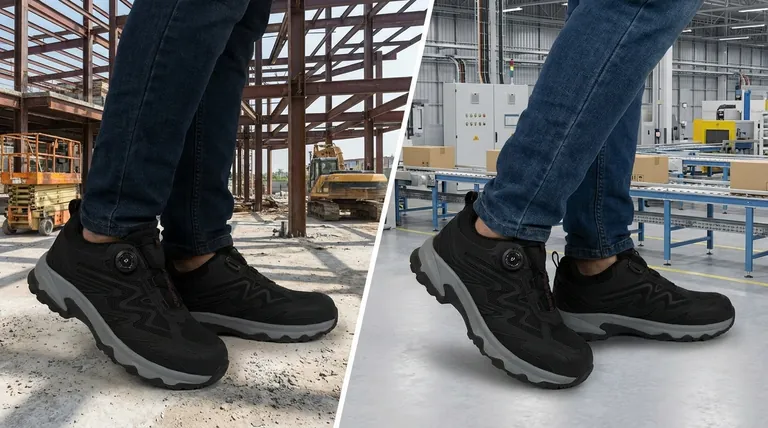
The Fundamental Difference: Material and Design
Understanding what each safety toe is made of reveals its inherent strengths and weaknesses. The material dictates how the shoe will perform under various conditions.
Steel Toe: The Classic Standard
A steel toe cap is a piece of heavy-duty steel integrated into the front of the shoe. Its primary function is to provide the highest possible resistance against crushing forces and direct impacts from heavy objects.
This simple, robust design has been the industry benchmark for decades due to its proven strength and durability.
Composite Toe: The Modern Alternative
Composite toes are crafted from a blend of non-metallic materials. These can include carbon fiber, plastic, Kevlar, or fiberglass.
The goal of this design is to meet standardized safety requirements (like ASTM standards) without the weight and conductivity of metal, offering a more specialized safety solution.
Comparing Key Performance Factors
When choosing between steel and composite, your decision will hinge on how you prioritize the following factors based on your job's demands.
Impact & Compression Protection
Steel toe caps offer the highest level of resistance to impact and compression. For jobs involving the risk of extremely heavy falling objects, like heavy manufacturing or construction, steel provides the ultimate protection.
Composite toes also provide excellent protection and must meet the same ASTM safety standards for impact and compression. However, steel can typically withstand a higher maximum force before failing.
Weight & All-Day Comfort
Composite toes are significantly lighter than steel toes. This reduction in weight can lead to less foot fatigue over a long workday, making them a preferred choice for workers who are constantly on their feet or walk long distances.
The heavier nature of steel can be noticeable, especially at the end of a long shift.
Thermal & Electrical Conductivity
This is a critical distinction. Composite toes are non-conductive, meaning they do not transfer heat, cold, or electricity. This makes them ideal for electricians or anyone working in extreme temperature environments, as they provide better insulation.
Steel is a natural conductor. In very cold weather, the steel cap can become cold, and in hot environments, it can retain heat. While properly insulated boots mitigate this, steel is inherently conductive to electricity, posing a risk in certain electrical environments.
Metal Detection & Security
Composite toes are the clear choice for any role that requires passing through metal detectors. Professionals in airport security, logistics, and secure government facilities benefit from not having to remove their footwear.
Steel toes will reliably trigger metal detectors, which can be a significant inconvenience in certain professions.
Understanding the Trade-offs
Neither option is perfect; each comes with specific limitations you must consider before making a final decision.
The Bulk Factor
To achieve the same level of safety rating as steel, a composite toe cap often needs to be slightly thicker and bulkier. This can affect the overall profile and fit of the shoe.
While steel is heavier, the toe cap itself can be made thinner and less obtrusive while still providing maximum strength.
Durability After an Accident
A key advantage of steel is its ability to bend and deform under extreme impact without shattering. It can often withstand multiple impacts, though any safety shoe should be replaced after a significant incident.
The integrity of a composite toe can be compromised after a single major impact. It may not show visible damage, but its protective structure could be weakened, necessitating immediate replacement.
Making the Right Choice for Your Industry
Your profession dictates your priorities. Use this guide to select the safety toe that aligns with the primary demands of your job.
- If your primary focus is maximum impact resistance (construction, manufacturing, heavy machinery): Choose steel toe for its superior strength against crushing forces.
- If your primary focus is working around electricity or in extreme temperatures (electricians, welders, outdoor work): Choose composite toe for its non-conductive, insulating properties.
- If your primary focus is all-day comfort and frequent walking (logistics, warehouse roles): Choose composite toe to minimize foot fatigue due to its lighter weight.
- If your primary focus is passing through metal detectors (airport staff, security guards): Choose composite toe to avoid the daily hassle of security screenings.
Ultimately, selecting the right safety shoe is a crucial investment in your personal on-the-job safety and comfort.
Summary Table:
| Feature | Steel Toe | Composite Toe |
|---|---|---|
| Primary Material | Heavy-duty Steel | Carbon Fiber, Kevlar, Plastic |
| Impact/Compression Protection | Highest Level | Meets ASTM Standards |
| Weight | Heavier | Lighter |
| Electrical/Thermal Conductivity | Conductive | Non-Conductive |
| Metal Detector Friendly | No | Yes |
| Ideal For | Heavy manufacturing, construction | Electricians, logistics, extreme temperatures |
Ready to Equip Your Team with the Right Safety Footwear?
As a large-scale manufacturer, 3515 produces a comprehensive range of certified safety footwear for distributors, brand owners, and bulk clients. Our production capabilities encompass all types of steel toe and composite toe shoes and boots, ensuring durability, compliance, and worker comfort.
Let us help you make the safest choice. We can guide you to the perfect footwear solution tailored to your specific industry hazards and operational needs.
Contact our experts today for a consultation and discover how we can support your business.
Visual Guide
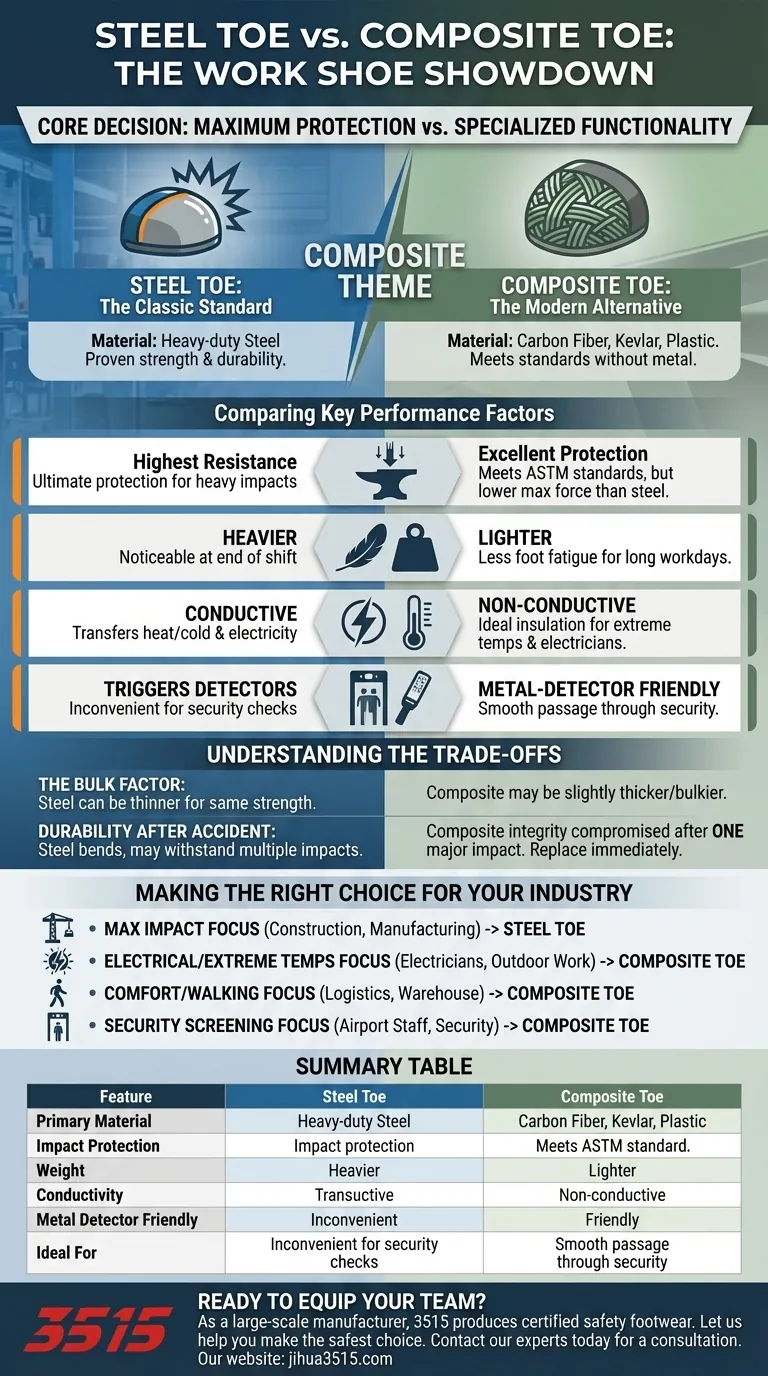
Related Products
- Advanced KPU Athletic Safety Shoe with Steel Toe Cap Anti-Slip Rotary Lacing System
- Wholesale Safety Footwear Manufacturer for Bulk & Custom OEM Orders
- Wholesale Premium Waterproof Nubuck Safety Shoes Boots
- Heavy Duty Nubuck Safety Boots Safety Shoes for Global Distribution
- Premium Sport Style Safety Boots for Bulk Orders
People Also Ask
- How can leather conditioner improve steel toe boot comfort? Soften Stiff Leather for a Better Fit
- According to OSHA, when are steel toe boots required in the workplace? A Guide to Compliance
- What are the recommended uses for steel toe safety shoes? Essential Protection for High-Risk Industries
- How does composite toe protection compare to steel toe? Choose the Right Safety Boot for Your Job
- What are the benefits of wearing proper work socks with steel toe boots? Boost Comfort & Safety
- How much weight can steel toes and composite toes handle? Both Protect Against 2,500 Pounds
- How much weight can steel toe boots typically withstand? 2,500 lbs of Crush Protection Explained
- Why is the use of steel-toe safety footwear critical during the maintenance of sugar factory press chains? Protect Your Team
